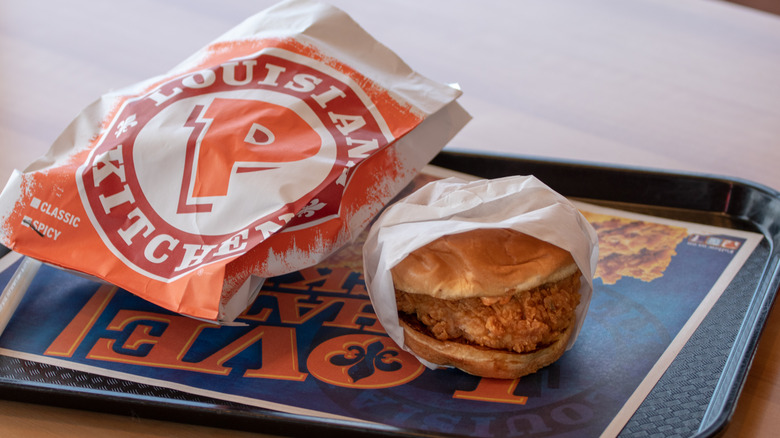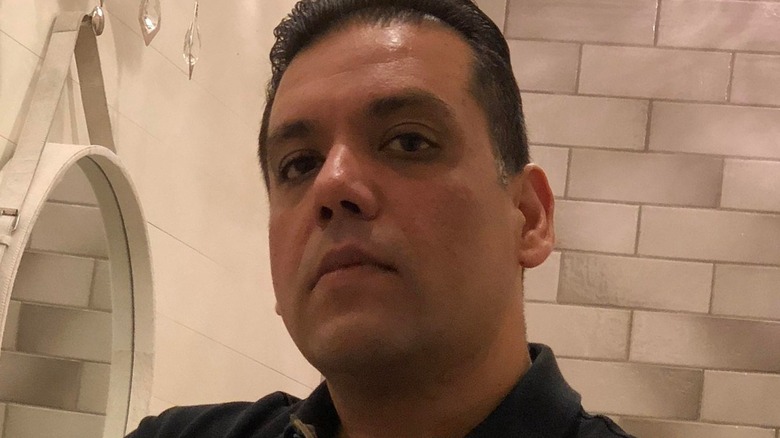The Sad Story Behind 1 Popeyes Franchisee's Bankruptcy
"Brace yourself for the new normal," they said three years ago when the COVID-19 pandemic was beginning. No one knew that quite so well as independent restaurant owners like celebrity chef and "Restaurant Hustle" participant Antonia. Lofaso, who gave Mashed, a window into just how challenging the first year and a half actually became. Now, as the world enters the fourth year of the post-pandemic era, the restaurant industry, overall, is still in search of solid footing.
In late February 2023, a full 92% of restaurant operators surveyed by the National Restaurant Association said that inflation, and particularly the high cost of procuring food, has created significant challenges. Other factors include higher interest rates (which make it harder for restaurants to exercise financial leverage) and difficulty hiring due to an apparently smaller pool of willing restaurant workers. But it's not just independent restaurants feeling the pinch.
Restaurant Brands International (RBI) is the parent of four major quick service restaurant chains (aka fast food joints)& Burger King, Tim Horton's, Firehouse Subs, and Popeyes. Since the beginning of 2023, three franchisees in RBl's vast system have declared bankruptcy, per Restaurant Dive. The first two were the behemoth Burger King franchisees, Toms King and Meridian Restaurants Unlimited. The latest is a Popeyes franchisee, Premier Cajun Kings LLC (PCK).
On March 14, PCK filed for reorganization under Chapter 11 of the Bankruptcy Code in Alabama federal court, according to court papers published on Court Listener. And brace yourself because this is one sad story.
The now bankrupt Popeyes franchisee was run by a seasoned industry veteran
By most accounts, it would appear that the sad tale of the bankruptcy of the Popeyes franchisee, PCK, begins with the sudden death of its owner, Manraj "Patrick" Sidhu, who graduated from college (Punjab University) in 1997 and founded the company in 2018, according to court papers filed by David Baker, Managing Director of Aurora Management Partners Inc., the financial consulting and advisory firm retained by PCK to provide crisis management. Starting with just six restaurants in the Birmingham, Alabama area, Sidhu grew that number to 30 locations across Alabama, Georgia, and Tennessee. Employing nearly 400, the company clocked sales of $30 million in 2020 and 2021
Sidhu wasn't a fast-food chain franchisee novice, however. Starting in 2010, he acquired multiple Burger King locations through the PCK affiliate, Premier Kings, which is still, apparently, a going concern. Additionally, in 2018, he began acquiring Qdoba Mexican Grill and Hummus & Pita Co. locations as well. And that may, in fact, be where things actually began to go awry: By 2021, the last Hummus & Pita had shuttered.
Within less than a year after that, on May 24, 2022, Sidhu was dead. The cause does not appear to have been publicly disclosed. Shortly after, on June 2, Sidhu's estate retained Aurora to see it through what was expected to be a difficult transition, in part because Sidhu was PCK's sole owner and member of management.
The death of its sole owner and manager plunged the Popeyes franchisee into financial disarray
In the wake of the death of its sole owner and manager, PCK, the company that Patrick Sidhu formed in 2018 to become a franchisee of multiple Popeyes restaurants, began hemorrhaging cash, according to a March 14 declaration filed in Alabama federal court. "Due to low performance and increasing losses," Baker stated under penalty of perjury, PCK "made the difficult decision to close 10 [Popeyes] restaurants throughout Alabama and Tennessee in an attempt to avoid further losses and to stabilize the business." In addition, an 11th location lost its lease via an eviction proceeding brought by the landlord — thereby leaving PCK's portfolio of Popeyes restaurants diminished by one-third as of March 14, 2023, the date of the company's bankruptcy filing.
Sadly, however, these closures did not do enough to stabilize PCK's business amid the challenges presented by post-pandemic economic realities, coupled with the loss of the person who was, essentially, the brains behind the entire operation. "Facing increased pressure from landlords, vendors, and its secured lender [PNC Bank]," PKC found itself with no choice but to seek bankruptcy protection under Chapter 11 of the Bankruptcy Code, Baker declared.
Chapter 11 affords those companies that avail themselves of it, an opportunity to restructure their debts and ultimately reorganize. Although that is the hope of what remains of PKC, the plan going forward will likely be the sale of these Popeyes restaurants to another franchisee.


